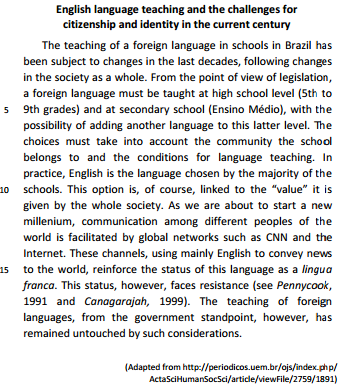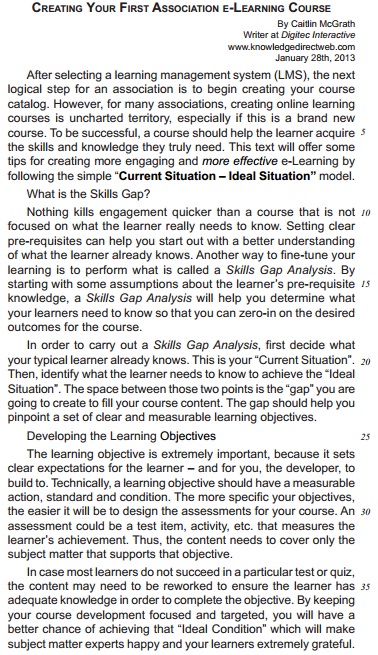Questões de Inglês - Verbos modais | Modal verbs para Concurso
Foram encontradas 300 questões
In the text about IT-managers, the word
“could” (L.17) can be replaced by can without any change in the meaning of the text.
Read text I and answer the question.


Internet: <www.scielo.br> (adapted).
The modal “should" in the fragment (L.34) is used to express the idea of obligation or duty.

Internet: <tesl-ej.org> (adapted).
Based on the text, judge the item below.
The modal verbs “can” and “should” (L.24) are synonymous.
– Consider the sentence: “If I’m just standing at the corner, I may not even see the light change” (l.38), and the following statements:
I. It is an example of the first conditional.
II. The modal verb ‘may’ expresses possibility.
III. ‘may’ could be replaced by ‘will’ without causing any difference in meaning.
Which ones are INCORRECT?

1. The ECOWAS COMMISSION has allocated own funds towards the cost of the Supply, Deployment & Installation of Network Equipment at the ECOWAS Commission Headquarters Data Centre, Abuja.
2. The ECOWAS Commission therefore invites sealed bids for the Supply, Deployment & Installation of Network Equipment at the ECOWAS Commission Headquarters Data Centre, Abuja described above in one lot.
3. The Bidding Document can be obtained at the Procurement Division, Directorate of General Administration, ECOWAS Commission, Plot 101, Yakubu Gowon Crescent, Asokoro District, Abuja, Nigeria, upon submission of a written request and payment of three hundred US Dollars (US$300.00) by Cash or Bank Draft made in favour of ECOWAS Commission, Abuja .
4. For Bidders outside Nigeria, the Bidding Document can be mailed to interested Bidders upon payment (by Transfer) of non-refundable fee of US$300.00 to the Commission (transfer charges born by the bidder). (Account Details available on request.)
5. Interested Bidders may obtain further information at the address below, during office hours: Monday to Friday from 9.00am (8.00am GMT+1) to 4.00pm (3.00pm GMT+1), ECOWAS Commission, Directorate of General Administration, Procurement Division, 1st Floor, Plot 101, Yakubu Gowon Crescent, Asokoro District, PMB 401 Abuja Nigeria.
E-mail: [email protected]
6. Bids shall be valid for a period of 120 (days) after Bid Opening and must be accompanied by a bid security of US$20,000.00 (Bank Guarantee or Insurance Bond).
7. Bids shall be delivered in sealed envelope and deposited in the ECOWAS Tender Box located Office of the Executive Assistant of Commissioner of Administration & Finance, fifth (5th) floor of the ECOWAS Commission Building, 101, Yakubu Gowon Crescent Asokoro District, P. M. B. 401, Abuja, Nigeria on or before November 7, 2013 at 11.30am (10.30am GMT+1) and clearly marked “International Competitive Bidding for the Production of ECOWAS Biometric Laissez Passer and Supply of Equipment” Do Not Open, Except in Presence of the Committee.
8. Bids will be opened in the presence of the bidders who wish to attend on November 7, 2013 at 12.00 noon (11.00am GMT+1), Room 523, Ecowas Commission, Abuja, Nigeria.
(The Economist, September 4th, 2013. Page 86. Adaptado.)
Douglas: It’s good to have you here, cousin! Would you like some wine?
Claudia: Sure. Douglas, remember when we were kids and we used to visit grandma every Sunday for lunch? Douglas: Yes. We would spend the whole day playing in the backyard! Too bad we can’t turn back time…
Claudia: You’re right… I guess I would have spent more time with her. She used to take such good care of us. She would make us those delicious chocolate chip cookies, then she would buy us all Christmas presents.! She has always enjoyed being around her grandchildren!
Douglas: Yeah… If I had grandchildren, I would be exactly like she was to us.
Claudia: So would I! I would rather be like her than being a lonely old lady.
De acordo com o diálogo acima, nas expressões destacadas, o verbo modal would é empregado para indicar, respectivamente,
I would1 look to generate in my friends, and across my generation, a commitment to serving. Whether in schools, hospitals, or on wilderness trails, I’d hope 2 to create in each of us a new, expanded sense of citizenship. We’d spend 3 a year of our lives, before jobs, children, and mortgages complicate our options, building an America where serving is not the obligation of a few – or a possibility only to the privileged.
It would be 4 a real choice for everyone. If I were 22 I’d want to give 5 myself an answer to the question: “Where did you serve?”
Teaching English as a foreign language teacher: job description
Teaching English as a foreign language (TEFL) involves teaching adults and children whose first or main language is not English. This can be done in the UK or abroad and the students may be learning English for either business or leisure reasons.
Teaching English to speakers of other languages (TESOL) is also a widely used term and often means the same thing as TEFL. It’s sometimes specifically used to refer to teaching English to people who are living in the UK but who do not speak English as a first language. These students are most commonly refugees and immigrants and need to learn the language in order to help them settle into the UK society.Their courses are often government funded.
Teaching English as a second language (TESL) or teaching English as an additional language (TEAL) may also be terms that are used but they generally all refer to the same thing - teaching English to someone whose native language is not English.
Teachers of English as a foreign language can work in a variety of settingswith different age ranges. This can include commercial language schools, schools and institutions of further and higher education throughout the UK and overseas. Some may also teach in industry, while others are self-employed. Classes are usually taught in English, evenwith beginners. Teaching English as a foreign language teacher: job description
Adapted from: < www.prospects.ac.uk/case-studies-working- abroad>
1. You ___________ smoke in the classroom. It’s forbidden.
2. You ___________ study hard for the final tests.
3. You smoke too much. You ___________ to quit smoking.
Choose the correct modal verbs that complete these sentences, respectively
The word which can replace may (line 11) without changing its meaning is
No change in meaning will occur if “need not be seen” (l.20) is replaced with must not be seen.
The modal auxiliaries in “Setting clear pre-requisites can help you…” (L. 11-12) and “… the content may need to be reworked…” (L. 35) convey the notion of:

The road sign above means that you _____ reduce speed.








